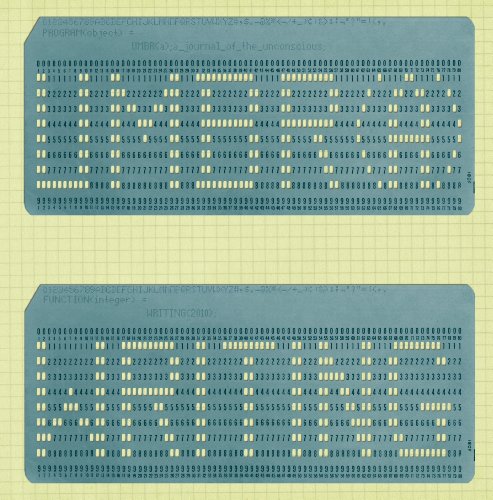Items related to Umbr(a): Writing

Indeed, if there is anything that makes psychoanalysis today uniquely situated to approach the question of writing it is the way in which it inherits -- in a structurally irrevocable way -- the distinction between speech and writing. Writing has been fundamentally, but almost paradoxically, implicated in psychoanalysis from the very outset. Freud became convinced of the existence of the unconscious through direct and repeated experience of its manifestations in the speech and acts of his analysands. However, in order for his singular discovery to be useful and convincing to others who had not had the benefit of direct experience he was compelled to write. This point cannot be emphasized enough: Psychoanalysis, as it exists today, is a direct consequence of the manner in which Freud translated and transmitted his clinical experience through the fundamentally incompatible register of writing. In his case histories, for example, Freud makes it abundantly clear that what he has written is by no means a wholly accurate or linear representation of the course of the analysis in question. What the reader experiences will not be identical to what Freud experienced. Yet Freud nevertheless writes with the expectation of producing the same effect in his reader: a repetition of his inaugural experience of the unconscious. As readers of Freud, we inherit a very specific relation to repetition, and that repetition cannot be unbound from the writing of which it is a consequence. In this sense, Freud's writing has served, and continues to serve, as the base case for a peculiar sort of mathematical induction. Every reader must repeat the discovery of the unconscious and reinvent psychoanalysis, as if for the first time, while being constrained by nothing but the economy of Freud's writing. This is the Freudian wager: that the psychoanalysis we invent by reading what he has written will be, somehow, the same psychoanalysis.
"synopsis" may belong to another edition of this title.
LUCIE CANTIN is a psychoanalyst, psychologist, and co-director of training at Groupe Interdisciplinaire Freudien de Recherches et d Interventions Cliniques et Culturelles (GIFRIC) in Québec. She has published numerous texts on a wide variety of psychoanalytic topics. In English, she has published (with Willy Apollon and Danielle Bergeron) After Lacan: Clinical Practice and the Subject of the Unconscious (State University of New York Press, 2002).
SIGI JÖTTKANDT is a lecturer in the School of Arts and Media at the University of New South Wales in Australia. She is the co-founder (with Dominiek Hoens) of S: Journal of the Jan van Eyck Circle for Lacanian Ideology Critique and the author of two books, Acting Beautifully: Henry James and the Ethical Aesthetic (State University of New York Press, 2005) and First Love: A Phenomenology of the One (re.press, 2010). She is also co-editor (with Joan Copjec) of the forthcoming collection Penumbra: Counter-memories of the Present (re.press, 2012).
PIERRE KLOSSOWSKI (1905-2001) was a novelist, essayist, translator, and artist. His published works in English include Sade My Neighbor (Northwestern University Press, 1991), Nietzsche and the Vicious Circle (University of Chicago Press, 1998), and Such a Deathly Desire (State University of New York Press, 2007).
CATHERINE MALABOU is Professor of Modern European Philosophy at Kingston University in London after having taught at the Université de Paris-X, Nanterre. She is the author of numerous books, including The Future of Hegel: Plasticity, Temporality, and Dialectic (Routledge, 2004), The New Wounded: From Neurosis to Brain Damage (Fordham University Press, 2012), and The Ontology of the Accident (Polity, 2012).
TRACY MCNULTY is a Professor of Romance Studies and Comparative Literature at Cornell University. She is the author of The Hostess: Hospitality, Femininity, and the Expropriation of Identity (University of Minnesota Press, 2006) and Wrestling with the Angel: Experiments in Symbolic Life (Columbia University Press, forthcoming).
JUDITH MILLER is a psychoanalyst, philosopher, and former professor at the University of Paris VIII. She is the editor of Terre du CIEN, the journal of Le Centre Interdisciplinaire sur l'ENfant, and Pertinences de la psychanalyse appliquée (Éditions du Seuil, 2003). She is also the author of L'avenir de l'autisme avec Rosine et Robert Lefort (Navarin, 2010).
CATHERINE MILLOT is a psychoanalyst and author who has published numerous articles and books on sexuation, writing, and literature. Her books in French include Nobodaddy: L hystérie dans le sičcle (Distribution Distique, 1988), Gide, Genet, Mishima: Intelligence de la perversion (Gallimard, 1996), and La vocation de l'écrivain (Gallimard, 1991).
JEAN-MICHEL RABATÉ is Professor of English and Comparative Literature at the University of Pennsylvania, where he is also the Vartan Gregorian Professor in the Humanities. He has written and edited dozens of books, including Jacques Lacan: Psychoanalysis and the Subject of Literature (Palgrave-Macmillan, 2001), The Future of Theory (Wiley-Blackwell, 2001), and most recently The Ghosts of Modernity (University Press of Florida, 2010).
ALENKA ZUPANCIC is a Senior Research Fellow at the Institute of Philosophy, Slovene Academy of Sciences, Ljubljana; a member of the Ljubljana School for Psychoanalysis; and a lecturer at The European Graduate School. Her books in English include The Shortest Shadow: Nietzsche's Philosophy of the Two (The MIT Press, 2003), The Odd One In: On Comedy (The MIT Press, 2008), and Why Psychoanalysis? Three Interventions (Aarhus University Press, 2008).
"About this title" may belong to another edition of this title.
- PublisherThe Center for the Study of Psychoanalysis and Culture
- Publication date2012
- ISBN 10 0979953936
- ISBN 13 9780979953934
- BindingPerfect Paperback
- Number of pages156
- EditorJoan Copjec, Michael Stanish
Shipping:
US$ 5.75
Within U.S.A.
Top Search Results from the AbeBooks Marketplace
Umbr (A) : Writing
Book Description Softcover. Condition: Very Good. Slight edgewear to covers. Solid binding and clean text. No ownership marks, ex-lib marks, stamps or stickers. ; 8vo 8" - 9" tall; 156 pages. Seller Inventory # 11926

